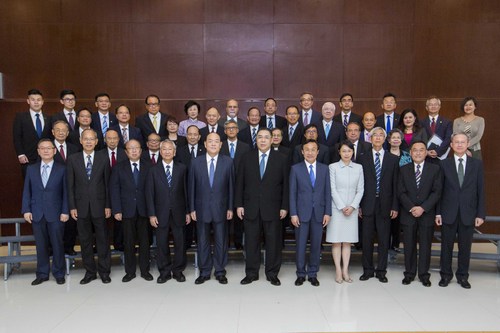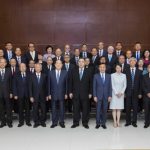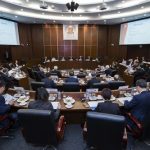 A group photo
A group photo
The University of Macau (UM) today (12 June) held the Joint Meeting of the University Assembly (UA) and University Council (UC) for the 2016/2017 academic year in its Ho Yin Conference Hall. Chui Sai On, chief executive of the Macao SAR, chancellor of UM, and chair of the UA, presided over the meeting. Chui said that an important task UM needs to fulfil in the future is to continue to produce talented and virtuous graduates to govern Macao, develop Macao’s economy, and carry on with the ‘One Country, Two Systems’ policy, adding that it is of great significance that UM fulfils this responsibility.
During the meeting, Chui said that as a public university in Macao, UM has made considerable progress in recent years in world rankings and comprehensive competitiveness, thanks to the support of the central government and the Macao SAR government. He noted that it is very important that everyone earnestly studies and understands the messages of the important speeches made by President Xi Jinping and National People’s Congress Standing Committee Chairman Zhang Dejiang during their visits to Macao, adding that these messages should serve as UM’s new guidelines on how to educate students. Therefore, an important task UM needs to fulfil in the future is to continue to produce talented and virtuous graduates to govern Macao, develop Macao’s economy, and carry on with the ‘One Country, Two Systems’ policy, adding that it is of great significance that UM fulfils this responsibility. The SAR government will continue to provide UM with resource- and policy-wise support as well as support in other forms. He hopes all UM members will work together with a shared goal in mind and continue to support the ‘building a better Macao through education’ strategy established by the central government and the SAR government.
UC Chair Lam Kam Seng summarised UC’s work over the past three years. He said that the UC promotes the university’s development in various areas by reviewing its master plan, development strategies, as well as annual and multi-year work plans, to make sure that the university’s development aligns the long-term development goals of Macao. He added that the UC supports UM in its effort to produce more talented and virtuous graduates who love China and Macao and care about society so as to make new contributions to the ‘One Country, Two Systems’ policy and the sustainable development of Macao.
Rector Wei Zhao reported the development of the university over the past year, including its progress in academic affairs, research, student affairs, and administration. He will ensure a smooth transition after he leaves his post, and the university will adopt a new residential college model and make continuous improvement in teaching quality, technology commercialisation, and administrative efficiency.
The UA and the UC consist of prominent members of the community, UM’s management, as well as representatives of faculty members, students, and alumni. The following individuals attended this year’s UAUC Joint Meeting: Chui Sai On, Lam Kam Seng, Lei Pui Lam, Lau Veng Lin, Ng Fok, Vitor Ng, Siu Yin Wai, Zhou Ligao, Maria Edith da Silva, Ho Iat Seng, Joaquim Jorge Perestrelo Neto Valente, Liu Chung Laung, D José Lai, Fok Chun-Wan, Kong Tat Choi, Tse Chi Wai, Tong Chi Kin, Ma Chi Ngai, Kou Kam Fai, Chui Sai Peng, Leong Heng Teng, Vong Hin Fai, Ip Peng Kin, Leong Lai, Iong Kong Leong, Sílvia Ribeiro Osório Ho, Wei Zhao, Lionel Ni, Rui Martins, Haydn Chen, Kou Mei, Jacky So, Philip Chen, Iu Vai Pan, Agnes Lam, Ao Peng Kong, Kot Man Kam, Darren Leong, He Zhaodong, and UA’s Secretary and UC’s Secretary-General Chan Woon Yin. Those who sat in on the meeting included Tam Chon Weng, secretary for social affairs and culture and O Lam, chief of the Office of the Chief Executive.
View gallery


